The Dan Voiculescu Foundation for Romania's Development is developing an innovative programme dedicated to accelerated demographic growth, which it intends to propose to the state authorities. Professor Dan Voiculescu, the founder of the doctrine of pragmatic humanism, has issued an urgent appeal to the authorities, emphasising the necessity for a robust national plan to combat the current demographic crisis. The programme is based on four key pillars: increasing the birth rate, with a particular focus on the role of women; reducing the ageing process; and halting migration.
The programme initiated by the FDVDR exemplifies a resolute and prudent approach to Romania's persistently declining population. It will be presented to the Romanian authorities for implementation. This programme, of national interest and national security, will encompass efficacious policies to reverse demographic decline. The measures will include financial support for families, augmented access to childcare, the advancement of sex education and family planning.
The objective of the FDVDR is to establish a unified and efficacious framework to stimulate the birth rate, reduce the ageing process, and encourage Romanians to return home. The Foundation requests that the state authorities provide support for this initiative, emphasizing that a robust nation is the foundation of a robust homeland.
The Dan Voiculescu Foundation for Romania's Development is committed to fostering collaboration with all relevant stakeholders in order to provide tangible solutions that will ensure a sustainable demographic growth, which is essential for Romania's future.
Official data indicate an alarming trend: by 2050, the country's population is projected to decline to approximately 15 million, with one-third of the population comprising pensioners. This demographic decline is driven by a confluence of factors, including poverty, inadequate health infrastructure, and the substantial migration of Romanians to countries offering more promising opportunities.
In recent times, approximately 300,000 Romanians have repatriated, in comparison to 200,000 who emigrated from the country during the same period. This notable shift in population migration highlights the potential for reversing demographic decline through the implementation of well-designed policies and the provision of adequate support for those who wish to return to their country of origin.
The decline in the birth rate persisted after 1990, resulting in the elimination of the post-war demographic surplus. The measures introduced in 2012 to stimulate the birth rate proved insufficient to reverse this trend. Factors such as economic instability, the scarcity of childcare facilities and social crises have collectively discouraged many Romanians from having children.

